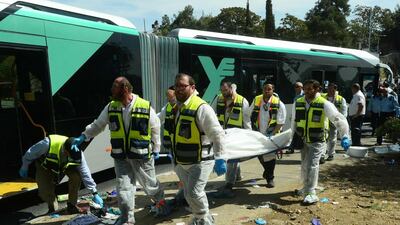JERUSALEM // Palestinian assailants killed three Israelis and wounded at least ten others yesterday in two attacks within minutes of each other in Jerusalem. Two of the attackers were killed by police.
A Palestinian was also killed in clashes with Israeli security forces in the West Bank city of Bethlehem. The death of Moataz Zawahra, 28, from a Bethlehem refugee camp, brings the number of Palestinians killed in the latest upsurge of violence to 30, including alleged attackers. Seven Israelis have been killed.
The Jerusalem attacks prompted the city’s mayor to call for “drastic steps’’ against Palestinian neighbourhoods as the most serious Israeli-Palestinian unrest in years intensified.
In the first attack, two Palestinians shot and stabbed passengers on a bus in the Armon Hanatziv neighbourhood, killing two Israeli men – one 45 years old and the other 60 – and wounding four people.
One of the assailants was killed by police and the other captured, rescue workers said.
Minutes later, another Palestinian drove his car into pedestrians at a bus stop in West Jerusalem, before alighting and stabbing his victims. One man was killed and six others wounded.
The attacker was wounded by a security guard and police and later died in hospital.
Meanwhile in Raanana, north of Tel Aviv, four Israelis were wounded during two stabbing attacks. Amateur video distributed by police showed that in one of the attacks, several men kicked and beat the alleged assailant as he lay on the ground. He was seriously injured.
Palestine Liberation Organisation secretary general Saeb Erekat said on Tuesday that new petitions would be sent to the International Criminal Court against Israel, accusing it of “extrajudicial executions”.
Israel’s policy of “shooting to kill” rather than arresting assailants is intensifying Palestinian anger, said Bernard Sabella, a member of the Palestinian Legislative Council from occupied East Jerusalem.
“When images come out of people being killed, questions are being asked of ‘Couldn’t the police contain that person?’’’ he said.
Much of the Palestinian violence stems from a widespread Palestinian perception that Israel is intent on imposing Jewish prayer at Al Aqsa mosque, Islam’s third holiest shrine, which is on a site revered by Jews as the Temple Mount.
Israel denies those charges, blaming Palestinian leaders for “inciting” violence.
Tuesday’s attacks in Jerusalem and Raanana came during what was declared by Palestinian factions, including Hamas and Fatah, as a “day of rage” against Israeli “crimes against our people”.
Prime minister Benjamin Netanyahu called for an urgent security cabinet meeting and said that Israel’s opponents will learn that “terror doesn’t pay” and that Israel is “here to stay, forever”.
Geula Nissim, 69, a resident of Armon Hanatziv, where the bus attack took place, now carries pepper spray in her purse. She said she bought it because of stabbing attacks in the last two weeks.
“It can’t be that you have to look to your right and your left all the time,” for fear of a Palestinian attacker, she said.
Asked if she thought there would be Jewish revenge violence for the bus attack, Ms Nissim replied: “I don’t want this. I am afraid of this. When I was at the clinic yesterday the doctors were treating Arabs and the young people said ‘we should kill them’. I said to them ‘we are not barbarians’.”
Police said the two Jerusalem attacks were carried out by Palestinians from the Jebel Mukaber neighbourhood, adjacent to Armon Hanatziv.
Palestinians in East Jerusalem, unlike those in the West Bank, are able to travel in Israel without restrictions. But Israeli officials said that internal security minister Gilad Erdan is considering a clampdown on East Jerusalem Palestinian neighbourhoods that would restrict the movement of their residents and also make it easier for Israelis to obtain gun licenses.
Jerusalem mayor Nir Barkat, speaking at the scene of the bus attack, called for “drastic steps”.
“We will not return to normalcy after this,” he said. “What is needed are drastic steps that will change reality.”But Mr Sabella, the Palestinian legislator, said more security measures against Palestinian areas is not the answer.
“The Israeli attitude should be ‘let’s talk to each other’ rather than ‘teach them a good lesson’,” Mr Sabella said
The top brass will be presenting “an operational plan that fits the continuation of incidents and their severity” at the cabinet meeting on Tuesday night, said Bentsi Sau, the acting Israeli superintendent of police.”
foreign.desk@thenational.ae
* With additional reporting from Agence France-Presse

